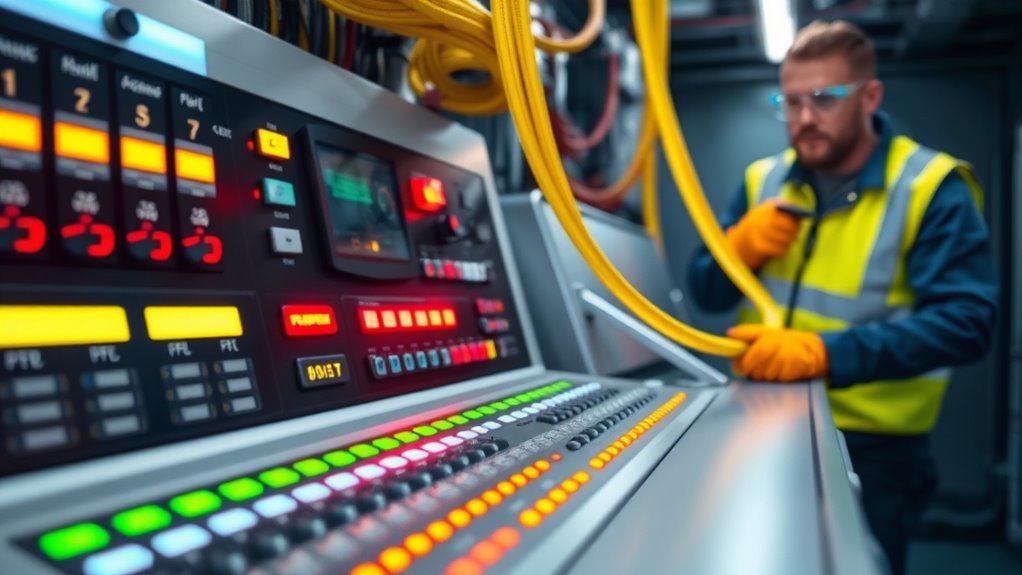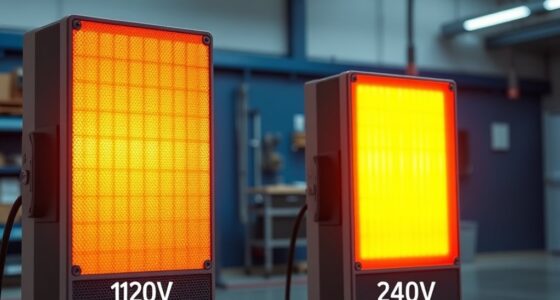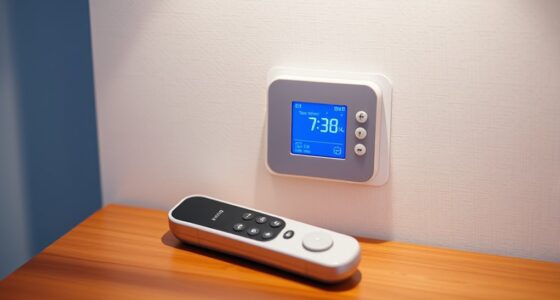To guarantee safe off-peak electricity use, know your appliances’ limits and avoid overloading circuits by spreading devices across different outlets. Make sure your wiring is up to date and protected with the right circuit breakers. Use reliable timers or smart plugs carefully, and regularly inspect your equipment for wear. Staying mindful of these rules helps prevent electrical hazards—stick around to learn which safety steps you might be missing.
Key Takeaways
- Know your appliances’ power ratings and avoid overloading circuits during off-peak hours.
- Ensure proper wiring and circuit protection to prevent electrical hazards and system failures.
- Use reliable timers and automation systems carefully to avoid unattended overloads and safety issues.
- Distribute high-power appliances across different circuits to prevent overloads and breaker trips.
- Regularly inspect and maintain your electrical equipment to ensure safety and efficient energy use.
Understand Your Appliance Limits and Capabilities
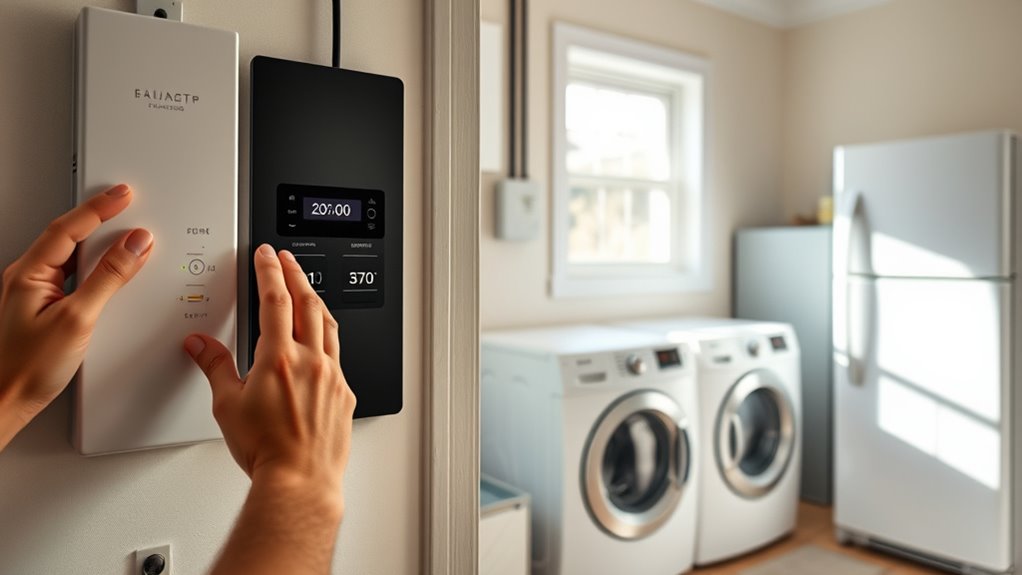
To effectively manage your electricity consumption during off-peak hours, you need to understand your appliances’ limits and capabilities. Start by checking each appliance’s power rating, which indicates how much energy it consumes. This helps you determine if your devices are compatible with off-peak usage without risking overloads. Appliance compatibility is essential; some appliances may require special settings or may not be suitable for off-peak operation altogether. Avoid plugging in multiple high-power devices simultaneously, as this can surpass your circuit’s capacity. By knowing each appliance’s power rating and understanding their limits, you can plan your off-peak usage more efficiently, reducing energy costs and preventing electrical issues. Understanding Appliance compatibility is crucial for safe and effective energy management during discounted hours.
Prioritize Proper Wiring and Electrical Setup
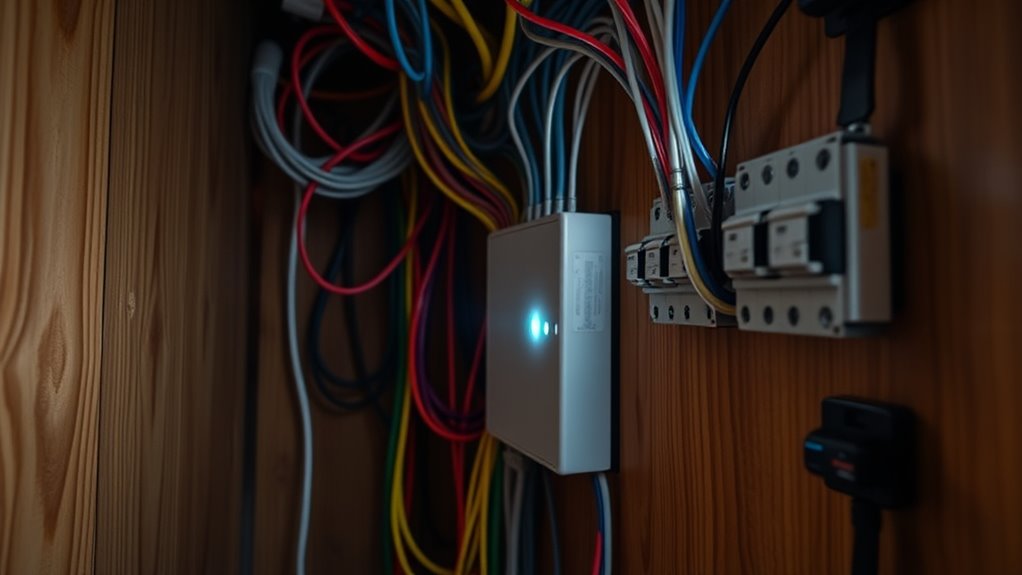
Ensuring your wiring and electrical setup are properly configured is vital for safe and efficient off-peak electricity use. Proper wiring helps prevent overloads and short circuits, reducing fire hazards and system failures. Prioritize circuit protection by installing appropriate circuit breakers and fuses to safeguard your appliances and wiring. If your current setup is outdated or inadequate, wiring upgrades are essential to handle increased loads safely. Upgrading wiring ensures that everything functions smoothly during off-peak hours without risking damage or safety issues. Always consult a licensed electrician to evaluate your system, perform necessary wiring upgrades, and install reliable circuit protection. Additionally, understanding electrical safety and proper installation practices can further prevent potential hazards. Taking these steps not only enhances safety but also maximizes the benefits of off-peak electricity, giving you peace of mind and efficient energy use.
Use Reliable Timers and Automation Safely
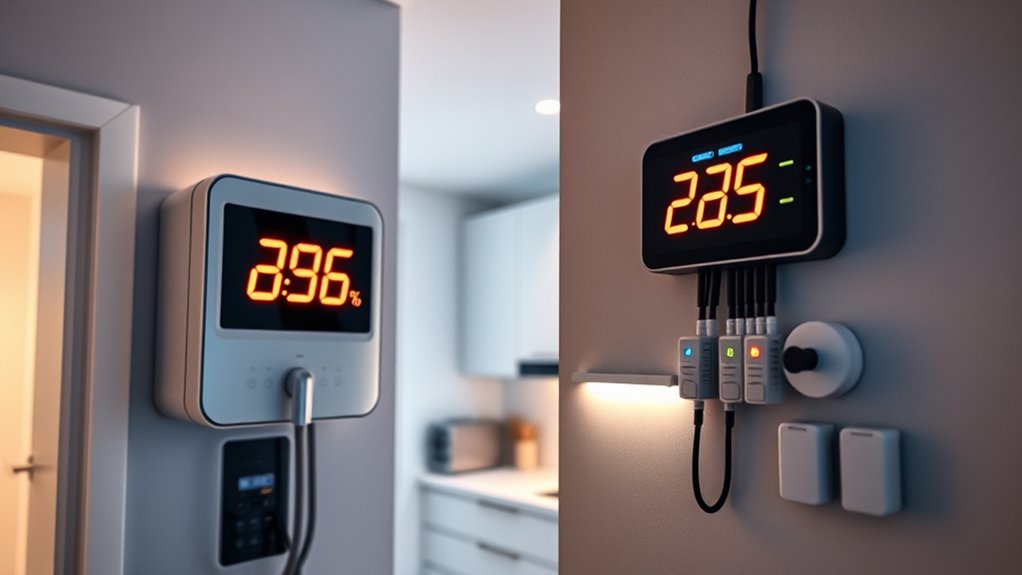
Using reliable timers and automation systems can substantially optimize your off-peak electricity use, but safety should always come first. Start by choosing a quality smart plug with built-in timers, ensuring it’s compatible with your devices. Set schedules carefully to prevent devices from running when unattended or during peak hours. Use remote control features to monitor and adjust your setup remotely, reducing the risk of malfunctions. Avoid overloading circuits by spreading out your devices and not exceeding recommended power limits. Always verify that timers are correctly programmed and functioning properly before leaving devices unattended. Regularly inspect your automation system for signs of wear or damage. Incorporating proper maintenance into your routine can help ensure the longevity and safety of your automation setup. By following these safety tips, you can maximize savings while minimizing risks associated with automation and smart plugs.
Avoid Overloading Circuits During Off-Peak Hours
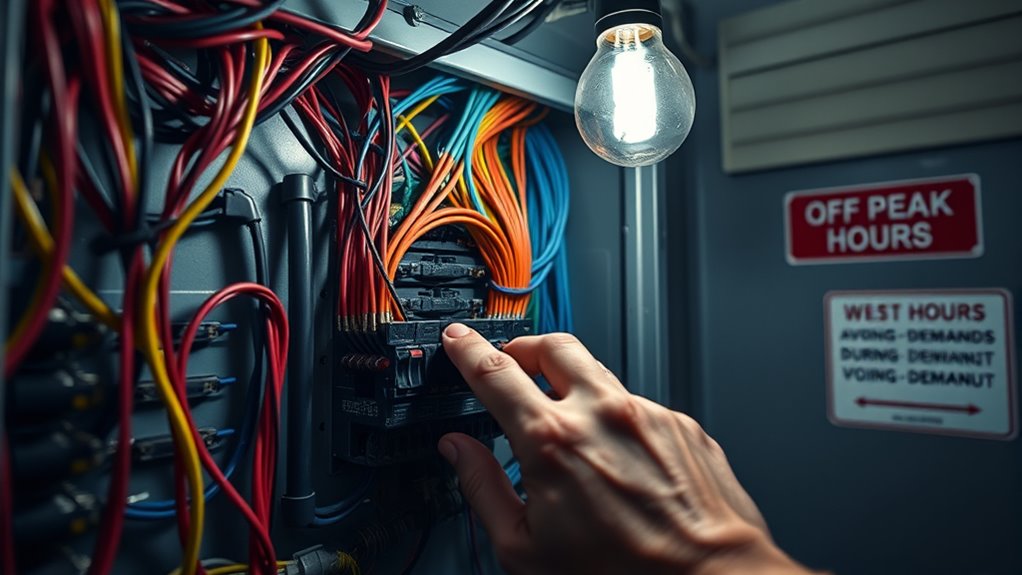
While taking advantage of off-peak hours to run appliances can save you money, overloading circuits can pose serious safety risks. Always be mindful of your circuit breakers; they’re designed to protect your wiring from overheating. Avoid plugging too many high-power devices into a single outlet or circuit, as this can trip the breaker or cause sparks. Use surge protectors with built-in overload protection to manage multiple appliances safely. Never bypass safety devices or overload outlets intentionally. If you notice frequent breaker trips, reduce your load immediately. Distribute your appliances across different circuits when possible. Remember that family photoshoot fails can sometimes lead to unexpected electrical hazards if not managed carefully. Keeping these precautions in mind helps prevent electrical fires and equipment damage, ensuring your off-peak energy savings don’t come at the expense of safety.
Regularly Maintain and Inspect Your Equipment
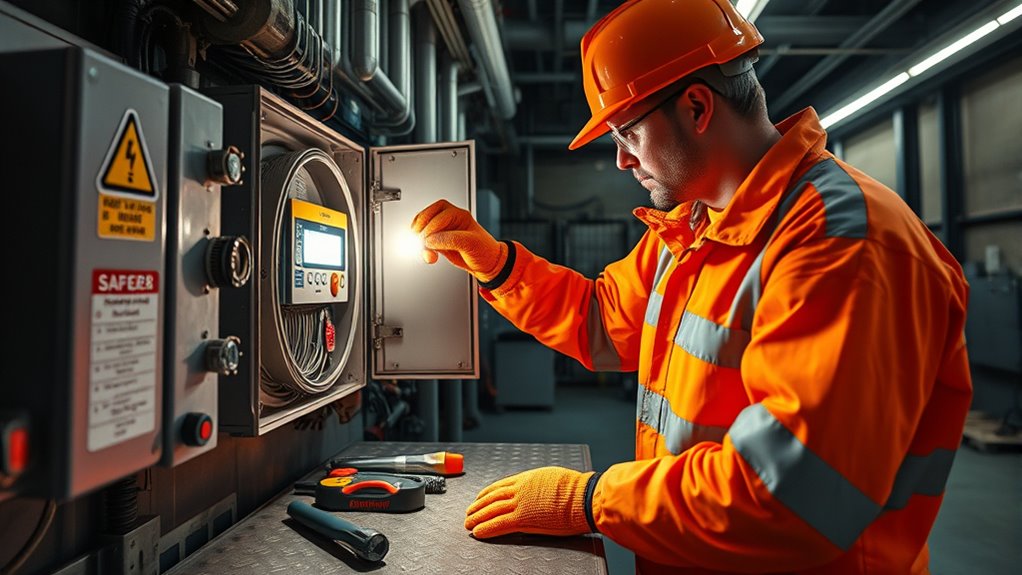
Regular maintenance and regular inspections are essential to keep your electrical equipment operating safely and efficiently. When you stay on top of these tasks, you reduce the risk of equipment failure that could lead to increased energy consumption or safety hazards. Regularly inspecting your systems helps identify wear and tear early, so you can address issues before they escalate. Proper user training ensures everyone understands how to maintain equipment properly and recognize warning signs. This knowledge minimizes downtime and optimizes energy use during off-peak hours. Additionally, understanding self-watering plant pots concepts can serve as a metaphor for maintaining proper moisture levels in electrical systems, emphasizing the importance of consistent care. By committing to routine maintenance and fostering user awareness, you improve safety, extend equipment lifespan, and make smarter decisions about energy consumption. Staying proactive is key to leveraging off-peak strategies safely and effectively.
Frequently Asked Questions
How Can I Identify Off-Peak Electricity Times in My Area?
To identify off-peak electricity times in your area, check your utility’s timing schedules, which are often posted online or on customer bills. Sign up for utility notifications or alerts that inform you about changes in off-peak hours. You can also contact your electricity provider directly for specific schedule details. Staying informed guarantees you maximize savings and avoid using high-energy appliances during peak times.
What Are the Common Signs of Electrical System Overload?
You’ll notice a circuit overload when lights flicker or circuit breakers trip frequently. Wiring faults can cause outlets to feel warm or emit a burning smell. If you hear buzzing sounds or see sparks, these indicate electrical system overload. Always pay attention to these signs, as they suggest your wiring might be compromised. To stay safe, avoid overloading circuits and contact a professional electrician to inspect potential wiring faults.
Are There Specific Safety Certifications for Off-Peak Electrical Equipment?
Yes, off-peak electrical equipment must meet specific safety standards and certification requirements. You should look for devices certified by recognized organizations like UL or CE, which ensure compliance with safety standards. These certifications verify that equipment has been tested for safety, reliability, and performance. Always check for proper certification labels before installing or using off-peak systems to prevent hazards and guarantee safe operation.
How Do I Safely Disconnect Appliances During Maintenance?
To safely disconnect appliances during maintenance, start by turning off the appliance’s power switch. Then, unplug the appliance carefully, gripping the plug firmly rather than the cord to prevent damage. Make sure your hands are dry, and if possible, wear insulated gloves. Always ensure the appliance is completely disconnected from the power source before performing maintenance to guarantee safety and prevent electrical shocks.
What Are the Legal Regulations for Off-Peak Electrical System Installations?
You must confirm your off-peak electrical system installation complies with legal regulations and installation standards. Check local wiring codes and obtain necessary permits before starting. Use certified professionals for installation to meet safety requirements and avoid penalties. Regular inspections help maintain compliance. Staying informed about changes in electrical laws ensures your system remains legal and safe. Always prioritize safety and legal adherence when managing your off-peak electricity setup.
Conclusion
By understanding your appliances, prioritizing proper wiring, using reliable timers, avoiding overloads, and maintaining your equipment, you guarantee safety and efficiency. Stay informed, stay cautious, and stay proactive—because safety isn’t just about following rules, but about making them part of your routine. When you respect your electrical system, you protect your home, your family, and yourself. Embrace these strategies, follow these rules, and turn off-peak savings into safe, smart energy habits.
